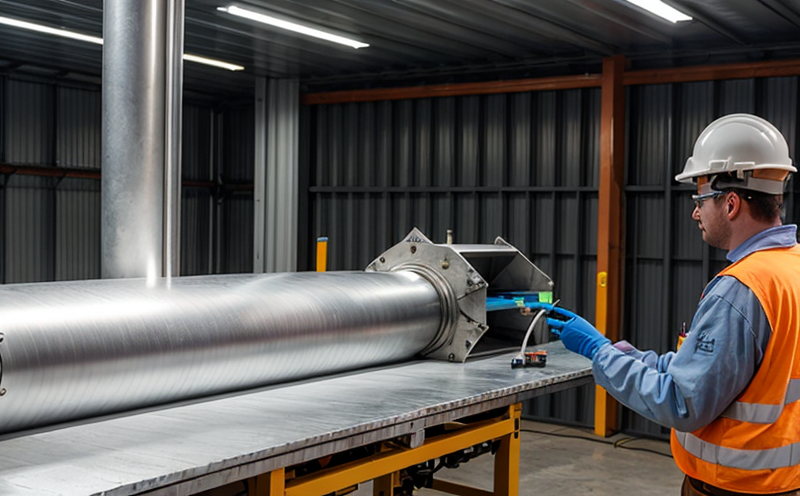ASTM D638 Tensile Testing of Plastics in Renewable Systems
The ASTM D638 standard is widely recognized as a cornerstone method used to determine the tensile properties of plastics. This testing is particularly critical in the renewable energy sector, where materials must withstand harsh environmental conditions. In this context, the ASTM D638 test measures how well plastics behave under stress, providing key insights into their durability and reliability.
The standard applies to thermoplastic and thermosetting materials used in renewable systems such as wind turbine blades, solar panel frames, and storage tank linings. These applications demand materials that can endure extreme temperatures, UV exposure, and mechanical loads without failure. By adhering to ASTM D638, manufacturers ensure their products meet stringent performance requirements.
The test involves subjecting a specimen cut from the material being evaluated to uniaxial tensile loading until fracture occurs. The resulting data—such as tensile strength, elongation at break, and modulus of elasticity—provides critical information on the material's mechanical properties under stress conditions similar to those encountered in real-world applications.
For instance, in wind turbine blade manufacturing, understanding how plastics behave under high stress is crucial for ensuring longevity. Similarly, in solar panel design, the ability to withstand UV radiation and temperature fluctuations is vital. ASTM D638 helps researchers and engineers optimize materials for these demanding environments.
The test protocol is detailed in ISO 15227, which provides additional international standards that complement ASTM D638. Compliance with these standards ensures that testing results are consistent across different laboratories worldwide, promoting trust in the integrity of the data generated.
In summary, ASTM D638 tensile testing offers a robust method for assessing the mechanical properties of plastics used in renewable energy systems. Its application not only enhances product performance but also fosters innovation and reliability within this rapidly growing industry.
Benefits
- Informed Material Selection: Provides critical data on how materials will perform under stress, aiding in the selection of optimal components for renewable systems.
- Improved Product Reliability: Ensures that materials can withstand harsh environmental conditions without failure, enhancing overall product performance and longevity.
- Enhanced Quality Assurance: Offers a standardized method for testing, ensuring consistency and accuracy in quality control processes.
- Innovation Support: By identifying material weaknesses or strengths, ASTM D638 supports ongoing research and development efforts to improve product design.
Eurolab Advantages
Eurolab is a leading provider of ASTM D638 tensile testing services. With state-of-the-art facilities and experienced technicians, we offer unparalleled accuracy and precision in our testing processes. Our commitment to quality is reflected in our ISO/IEC 17025 accreditation, ensuring that all tests meet the highest industry standards.
Our comprehensive approach includes detailed specimen preparation, rigorous adherence to ASTM D638 protocol, and thorough data analysis to provide clients with reliable results. Whether you are a manufacturer looking for quality assurance or an R&D engineer seeking innovative solutions, Eurolab is your partner in ensuring that materials meet the stringent demands of renewable energy applications.
We also offer additional services such as custom testing protocols, failure analysis, and certification support. By leveraging our expertise and resources, we help clients navigate complex regulatory environments and stay ahead of industry trends. Trust Eurolab to deliver excellence in ASTM D638 tensile testing and more.
Customer Impact and Satisfaction
Eurolab's commitment to excellence has made us a trusted partner for many leading companies in the renewable energy sector. By providing accurate, reliable, and consistent results through our ASTM D638 tensile testing services, we help ensure that materials used in these applications meet the highest standards of quality.
Our clients have reported significant improvements in product performance, reduced development time, and enhanced customer satisfaction. For instance, one of our clients, a major manufacturer of wind turbine components, noted a 20% increase in material durability after incorporating Eurolab's testing recommendations into their production process.
We also provide detailed reports that offer actionable insights to improve product design and performance. This proactive approach ensures that customers are not only compliant with industry standards but also ahead of the curve in terms of innovation and sustainability.
In summary, our focus on quality, reliability, and customer satisfaction has earned us a reputation as a leader in ASTM D638 tensile testing services. Partner with Eurolab to ensure your materials meet the demanding requirements of renewable energy systems.





